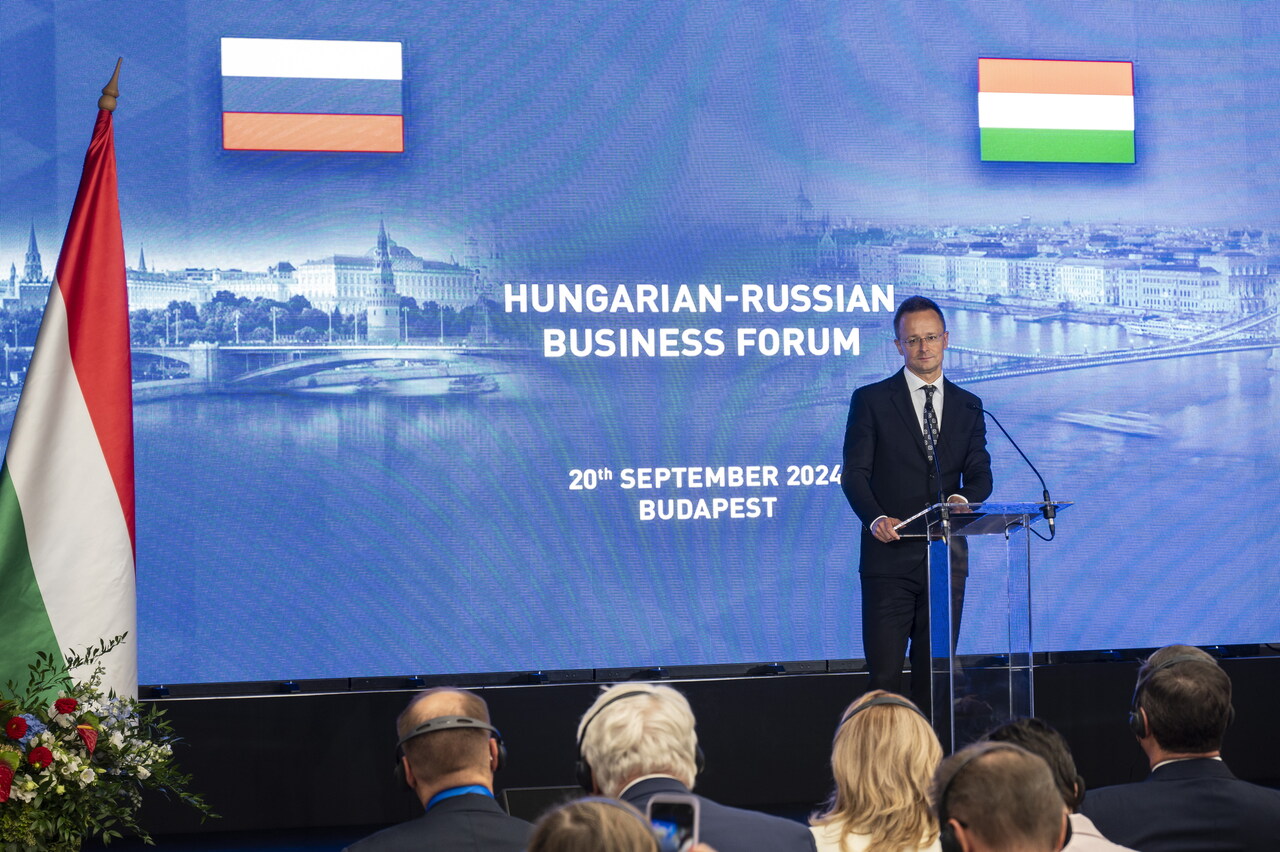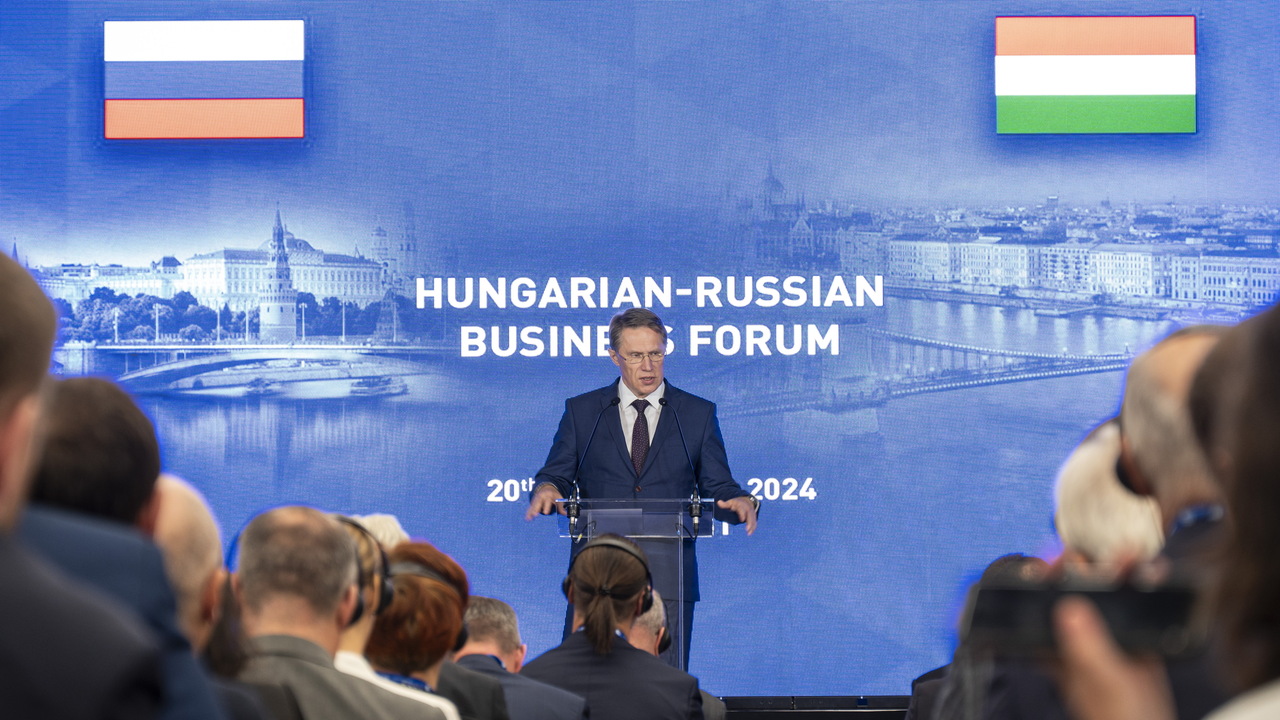Change language:
FM Szijjártó: Government supports growth of Hungarian-Russian business cooperation
Hungary’s government supports the advancement of cooperation between Hungarian and Russian businesses, Minister of Foreign Affairs and Trade Péter Szijjártó said at a Hungarian-Russian business forum in Budapest on Friday.
Szijjártó welcomed the Russian government’s support for Hungarian companies that aimed to enter the Russian market and cooperate with local partners. He added that a sign of the demand for such cooperation was shown by the representatives of the 78 companies at the forum.

He conceded that economic cooperation was “not the easiest” at the moment because of the international environment, but said that seeking Russian business partners wasn’t “a political dirty word” in Hungary.
He pointed to the presence in Russia of OTP Bank, Hungary’s biggest commercial lender, which made it easier for Hungarian companies to do business there, and to Hungarian oil and gas company’s production operations in Russia.
He said the upgrade of Hungary’s Paks nuclear power plant, by a Russian general contractor, offered opportunities for Hungarian companies, too.
He acknowledged that the physical delivery of goods, and even services, to Russia presented difficulties, but said work was underway on a solution with a regional partner that could soon give Hungarian companies an “enormous advantage”.
Szijjártó said that free trade and cross-border economic cooperation were in the fundamental interest of Hungary, while initiatives to form blocs ran counter to the country’s interest.
He said sanctions were doing more harm to the European Union than to Russia as economic players found ways to get around the measures.
Hungarian-Russian Intergovernmental Economic Cooperation Commission meets
The Hungarian-Russian Intergovernmental Economic Cooperation Commission convened for its 15th meeting in Budapest on Friday.
At a joint press conference after the meeting with Russian Minister of Health Mikhail Murashko, the commission’s co-chair, Szijjártó said stepping up economic cooperation with Russia in areas that were not affected by international sanctions was in Hungary’s economic, security and strategic interest. He added that Hungary was doing “what everybody else is doing, only they would rather do business with the Russians in secret”.

He warned of the risk of the world being divided into blocs again, adding that Hungary had lost much in the past as a result.
He said Hungary wanted the war in Ukraine to end as soon as possible and for there to be peace. He added that sanctions against Russia weren’t working as a significant part of European companies and countries found ways to circumvent those measures.
“The difference between us and the rest is that we speak openly and honestly about the matter,” he said.
Szijjártó acknowledged Moscow’s continued commitment to fulfilling the terms of Hungary’s gas and crude supply contracts. He noted that 5.3 billion cubic metres of Russian gas had been delivered to Hungary through the TurkStream pipeline so far this year.
Szijjártó said an agreement had been reached to further expand cooperation between Hungary’s state-owned energy group MVM and Russia’s Gazprom.
As a result, MVM’s role in regional gas trade could grow, he added.
He said 3.2 million tonnes of Russian crude had been delivered to Hungary through the Druzhba pipeline this year, adding that Hungarian and Russian companies’ “flexibility” had allowed supply to continue even as measures had been taken putting that supply at risk.
Szijjártó said the upgrade of Hungary’s Paks nuclear power plant had reached another milestone and more than 1,000 people now worked at the site, including the employees of American, German and French sub-contractors. The first concrete at the site will be poured by year-end, he added.
Pointing to the success of Hungarian companies in Russia, Szijjártó said a Hungarian company was now among the five biggest feed producers in Russia, while Hungarian pharmaceutical company Gedeon Richter supplied its products to over 10m patients in Russia. A meat plant in Saint Petersburg has been upgraded with Hungarian machinery and technology, he added.
He said an agreement was reached on enhancing cooperation in the areas of oncology and radiation therapy, while talks had started on producing vector vaccines in Hungary. Another agreement was signed on cooperation in higher education, he added.
Hungary will continue to offer 200 scholarships a year to Russian students to enrol at Hungarian universities, he said.
Read also:







